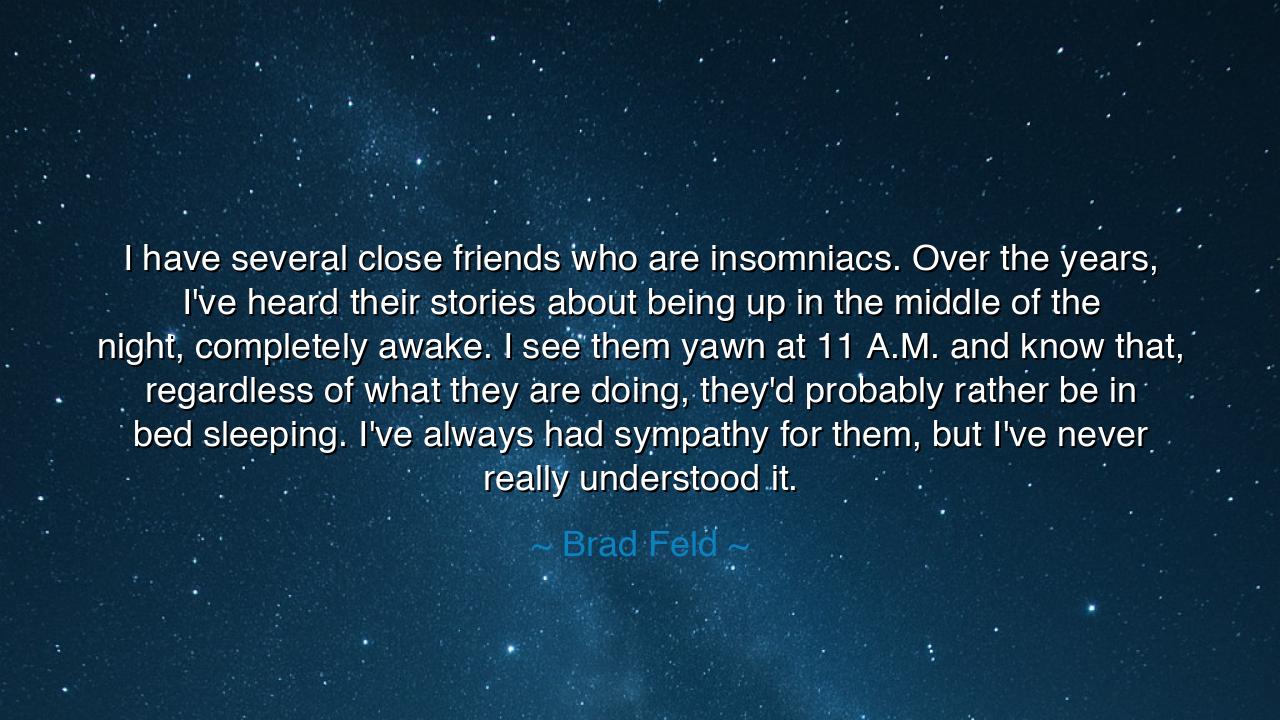
I have several close friends who are insomniacs. Over the years
I have several close friends who are insomniacs. Over the years, I've heard their stories about being up in the middle of the night, completely awake. I see them yawn at 11 A.M. and know that, regardless of what they are doing, they'd probably rather be in bed sleeping. I've always had sympathy for them, but I've never really understood it.






When Brad Feld observed, “I have several close friends who are insomniacs. Over the years, I've heard their stories about being up in the middle of the night, completely awake. I see them yawn at 11 A.M. and know that, regardless of what they are doing, they'd probably rather be in bed sleeping. I've always had sympathy for them, but I've never really understood it,” he revealed the chasm that exists between sympathy and understanding. His words remind us that though the heart may feel for the suffering of others, unless we ourselves have walked their road, a veil still lies between us and the fullness of their experience.
The plight of the insomniac is both ordinary and profound. Ordinary, because it touches so many lives in silence, robbing them of rest while the world slumbers. Profound, because sleeplessness is not merely the absence of sleep, but the presence of solitude, anxiety, and the endless turning of thoughts in the small hours of the night. Feld’s confession—that he has listened, that he has sympathized, but that he has not truly grasped it—speaks to a universal truth: that we can see another’s suffering clearly, and yet still remain on the outside of its mystery.
History is filled with such examples of the gap between empathy and experience. Consider the philosopher Boethius, who, when cast into prison awaiting his execution, wrote of the contrast between his old friends who pitied him from afar and the truth of the despair he lived alone within his cell. Their sympathy, though genuine, could not penetrate the full reality of his suffering. Only through his own inner dialogue, captured in The Consolation of Philosophy, did he confront the depth of his condition. Feld’s words echo this same paradox: to feel compassion is noble, but to truly know is beyond the reach of those who have not endured.
Yet, this acknowledgment is not weakness—it is humility. Too often, men and women presume to understand what they cannot. Feld instead admits honestly: “I have sympathy, but I do not understand.” This humility itself is a gift, for it opens space for deeper listening, for allowing the sufferer to speak without the burden of being explained away. It shows us that sometimes love does not consist in claiming to know, but in being willing to stand beside another in mystery.
The lesson, O seekers of wisdom, is that true compassion demands more than assumption. It demands patience, listening, and the willingness to admit the limits of our own perspective. To sympathize is to feel with the heart; to understand is to see with the eyes of shared experience. We cannot always reach the second, but we must not withhold the first. Feld reminds us that even imperfect compassion still matters—it still lightens the burden of the sleepless when they know someone cares, even if they cannot fully grasp the weight.
Practical action lies before you: when you meet another whose struggle you cannot share—be it illness, grief, exile, or sleepless nights—offer your sympathy without pretending to understand. Be present, listen deeply, and let your care be known. And if the day comes when you yourself walk that same road, let your newfound experience become a bridge for others, transforming sympathy into true understanding.
Therefore, let Feld’s words remain with you as both reminder and challenge: sympathy is the seed, but understanding is the fruit. Not all seeds grow into fruit, but even the seed has value. Offer your sympathy freely, humbly, and without pretense, for even when you cannot fully understand, you can still stand with another—and sometimes, that is enough to keep them from feeling utterly alone in their sleepless night.






AAdministratorAdministrator
Welcome, honored guests. Please leave a comment, we will respond soon